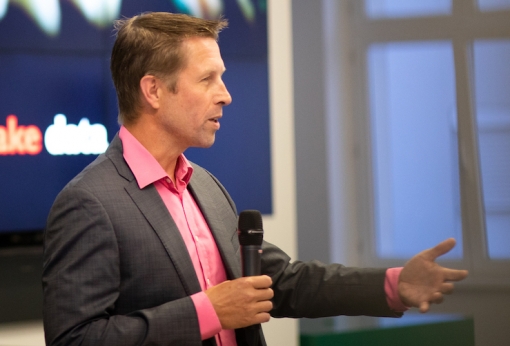
I spoke recently to Marco Brattinga. He is one of the thought leaders in the Netherlands when it comes to the practical use of Semantic Technologies in business environments.
SEMANTiCS: The organization is still struggling with uncertainty around the COVID measures in September. We expect that at least the Netherlands will be fully open that time. As we have a vivid Dutch Linked data community that’s doing a lot of interesting things, we organize every 3 mornings during the main conference a track that’s filled by Dutch industry. You are the main organizer of those local topics. Can you tell something more about your expectations of those workshops?
Marco Brattinga: Well “main organizer” might be too much of a credit! As chairs for the industry track, we try to get the most innovative and interesting solutions that are currently used or tested within the industry. Given the COVID situation, we had the opportunity to attract even more people that are working on challenges that require semantic solutions. As you mentioned, we have a very vivid Dutch Linked Data community, so we challenged them to come up with some interesting topics for which we expect that semantic technology has a promising answer. The community came up with four single topics, which are organized by individual industry workshop leads from the Dutch community: asset management, fair data sharing, social linked data (solid) and legal work. My expectations for these industry workshops are pretty high. I know that a lot of challenges are currently faced in these fields and a lot of groundbreaking work is currently undertaken. I expect to see a lot of new faces from these topic areas, and I expect very interesting cross-talks between people from the industry that are trying to solve those challenges, and people from the semantic community that can help with semantic technology.
SEMANTiCS: One of your recurrent themes is juridical ground and meaning. This is also one of the Dutch local topics. Can you tell me something more about this topic and what we may expect of this Dutch industry track in the conference?
Marco Brattinga: The semantics of legal text is one of the most interesting topics one might face, I think. For centuries we, as a society, try to write down laws and regulations that conform to the way we like to live together. But this is hard. Legal texts are not easy to understand: not for ordinary people, and even less for computers! People have struggled to create IT systems that are able to automate processes that are required by legislation: filing for a loan, applying for a permit, etc. We are now trying to create smart algorithms and apply artificial intelligence in this field. One of the challenges we are facing is that even more complex systems and legislation are created. How can we, ordinary people, still understand such systems and rules? How can we explain why particular legislation is needed and what it means? These are questions for which semantic technology is part of the answer. And indeed, multiple initiatives are currently undertaken that might change the way we formulate legislation and use technology to make this legislation more understandable and accessible for common people. I expect a lot of very interesting talks about this subject in the industry workshop. And what is, even more, special this year, that the industry workshop is aligned with the Legal Tech sub-track which takes place on the same day of the conference: we expect a lot of discussions around the coffee table as industry meets academia.
SEMANTiCS: What other expectations do you have on Semantics 2021 in Amsterdam?
Marco Brattinga: I honestly don’t really know what to expect, after more than a year with only interactions via online meetings. Semantics has always been a very inspiring environment and I have a lot of good memories from past events. I think everybody will be excited to meet each other in person and have vivid discussions about all things semantic. Much work has been done since Semantics ‘2019, so I’m really looking forward to the event!
SEMANTiCS: In your personal life you play in a band and you have a music studio in your cellar. What is the relation between those activities and your professional work on semantics?
Marco Brattinga: At least, being an IT professional made it possible for us to find out how we could still get together as a band and play music online together, using some fantastic open-source software called Jamulus. Latency is really a challenge with regard to audio (regular online meeting tools won’t work), but we made it work and practice virtually together, each band member from his own house. With respect to the relation with semantics: music is a means to convey a message and as I have found out on stage: if you can get your message across to your audience, that’s what matters.
Marco Brattinga MSc is Ordina’s principal expert for intelligent data-driven organizations. Marco studied Information Technology at the University of Twente. He has more than 15 years of experience as an IT architect and consultant in the public sector. Since 2011 he has been working on semantic web technology for the exchange of information between organizations and data management issues, in particular the semantic description of datasets. Marco is actively involved in various communities that stimulate semantic web technology in the public sector.